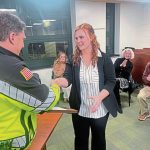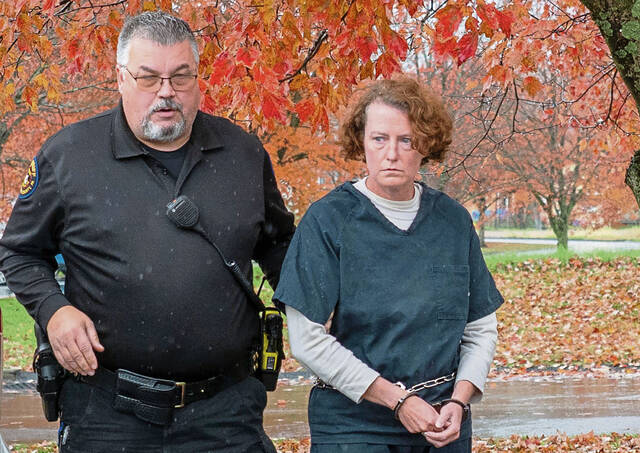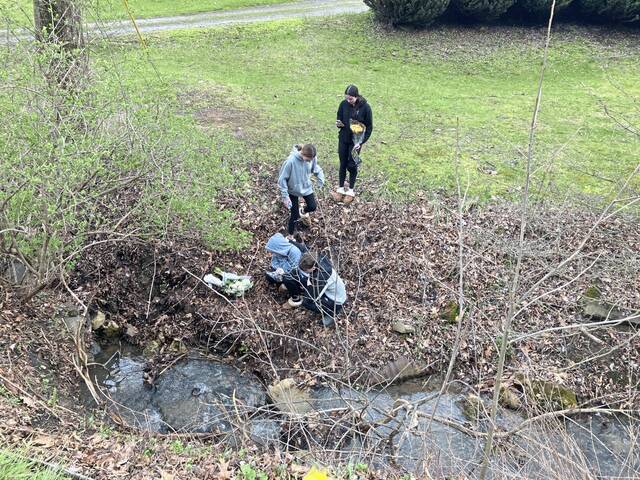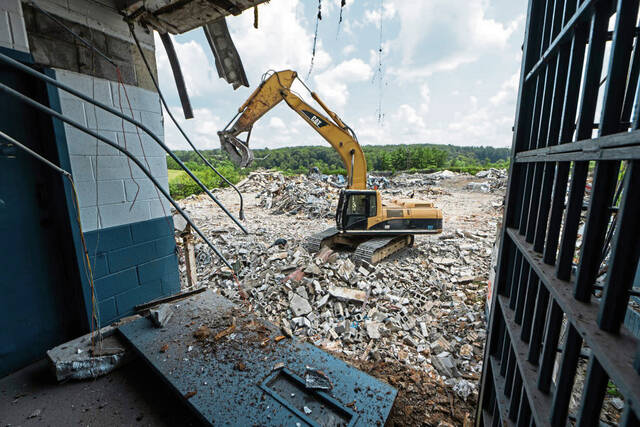Until two months ago, Penn-Trafford School District nurse Rhaeann Shepler had never performed CPR on a real person.
Her first shot at it saved not one life but two.
A little before 9 a.m. on a chilly Dec. 12 morning, Shepler sprang into action along with six of her co-workers to help restart the heart of special education teacher Alexis Simon, who was 8½ months pregnant.
Simon was in cardiac arrest and had stopped breathing. She required six minutes of CPR and the use of an AED in the short period before paramedics arrived at Trafford Middle School.
“I have worked in a hospital and everything, but it’s never been my patient. I’ve never had the opportunity to do CPR besides on a dummy in class,” Shepler said, noting she had recently been recertified for CPR. “(I was) just praying to God that He was giving me the courage to continue and that I was doing this stuff right.”
For Simon, the incident is a blur. One moment, she was sitting at her desk with fellow teacher Michael Cleland sending an email. The next, she was in Forbes Hospital in Monroeville, trying to piece together what had happened. It was her first time being in an ambulance or staying in a hospital.
Now resting on maternity leave at her Hempfield home with her husband, Dan, and newborn son, Dominic, who was born three days after her medical emergency, Simon can’t help but think of her co-workers’ actions as miraculous.
“Dominic and I had a guardian angel with us that day,” she said.
A close call
Surviving sudden cardiac arrest outside of a hospital is no small feat, according to Cheryl Rickens, EMS specialist with UPMC Prehospital Care and co-chair of the Western Pennsylvania Chapter of the Sudden Cardiac Arrest Association.
Nationally, only 10% of people who suffer cardiac arrest outside of a hospital survive, she said. In the Pittsburgh area, the number is between 20% and 24%. CPR increases chances of survival to 30%, and adding CPR plus the use of an AED increases it to about 50%.
“All that training that we sit through really paid forward on this event,” Rickens said.
Simon’s potassium levels were unusually low at the time of her medical emergency. Her doctors said this might have contributed, but going into cardiac arrest while pregnant is rare, she said.
A 2015 statement from the American Heart Association described cardiac arrest during pregnancy as “one of the most challenging clinical scenarios” and said that, according to data from the National Inpatient Sample, it occurs in 1 out of every 12,000 admissions for delivery in the U.S.
“Everywhere I went, no doctor was familiar with a pregnant woman going into cardiac arrest,” Simon said, adding that she was given supplements and had a potassium IV after the emergency. She is getting bloodwork every other week to check that her levels are going back to normal.
She has taken the past six weeks to focus on recovery. Simon is grateful to her substitute teacher, Leah Fertal, for handling her classes in her absence and says she has received “a lot of really nice emails” from her students.
She credits her husband, parents and sisters with looking out for her and her son and taking her to follow-up appointments.
“(Dominic) is sleeping very well — he sleeps at least six hours at night,” she said. “He is eating perfectly, and he is growing and right on track where he should be.”
Dominic was 6 pounds, 14 ounces when he was born. Doctors at West Penn Hospital in Bloomfield induced labor after Simon’s cardiac arrest because of concerns that the baby might need the neonatal intensive care unit, but Dominic came through without needing it, Simon said.
“He didn’t let his rough entrance into the world or coming early stop him,” she said. “He’s picking his head up. He’s curious. We are just enjoying every minute of him.”
Honoring heroes
The night after Simon suffered her cardiac arrest, she reached out to Shepler to thank her for saving her life.
“Throughout the day, I was gathering more and more (information). I didn’t know who was there or what, but I knew that Rhae was at school that day, and I knew it had to have been her (who helped me),” Simon said.
Last month, Shepler, school counselor Megan McGraw and Penn-Trafford nurse Michelle Stukus came over to meet Dominic, Simon said.
“We sat and talked for three hours,” she said. “That was the first time I had really heard what had happened — I was ready to hear it. It was nice to thank everybody in person.
“How do you thank someone for saving your life?”
At an awards presentation at a Penn-Trafford school board meeting this week, representatives from the Sudden Cardiac Arrest Association presented Simon, her colleagues and EMS officials who helped her with certificates honoring her survival and the work and quick thinking of those who kept her safe.
During the presentation, Rickens cited the chain of survival: awareness and action, calling 911, early CPR, early defibrillation, professional responders, transport, and rehab and recovery. Each person involved in helping Simon received a “hero” pin and Lifesaver candies.
“It’s hard to relive everything again, but it was really nice to see everyone,” Simon said of the ceremony. “I hadn’t seen the EMTs since the day, and I didn’t even know who they were because I didn’t remember anything from the day.
“They’re all the reason that Dominic and I are here today.”
McGraw, Fertal, teachers Gary Bacco and Cleland, resource officer Jonathan Kitterman, middle school Principal Roger Sullivan and Shepler all were honored.
“I think for the worst-case scenario, it happened at the best place possible — around people and with an AED at the school,” Shepler said. “The teamwork, it all just really came together.”



















